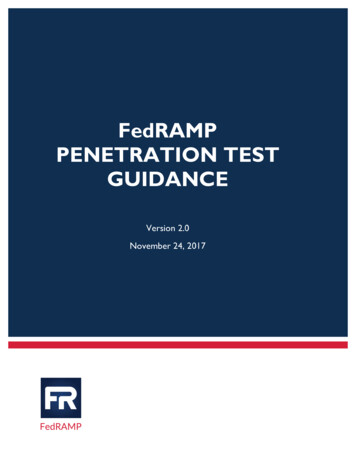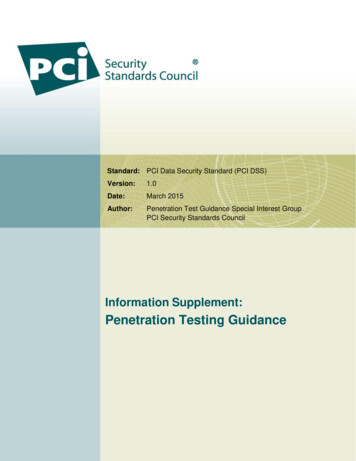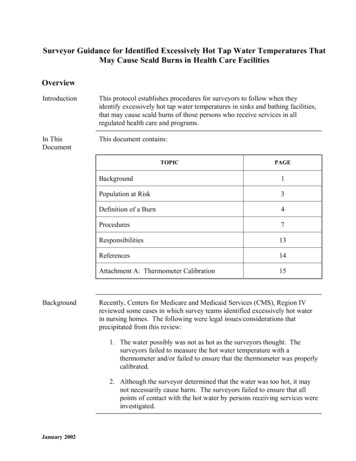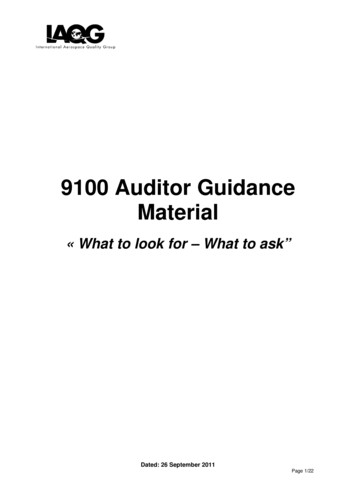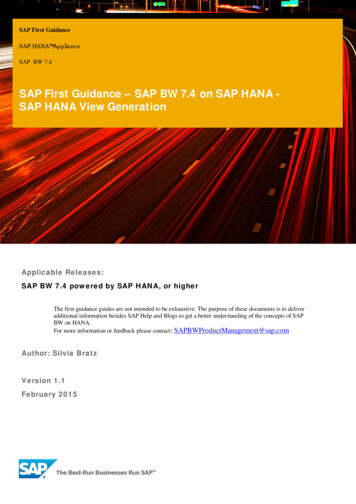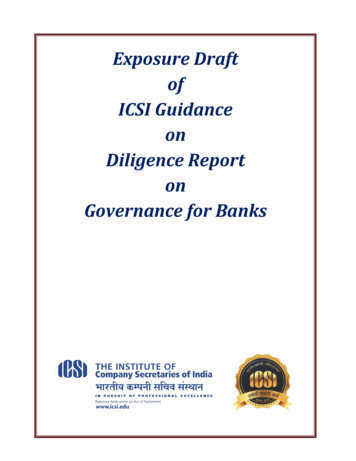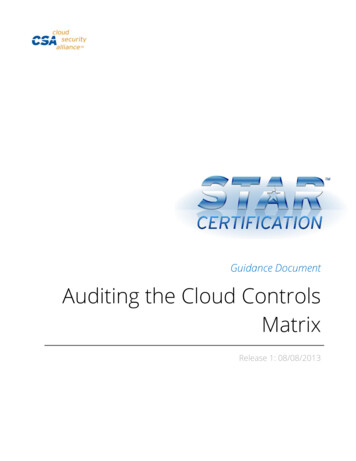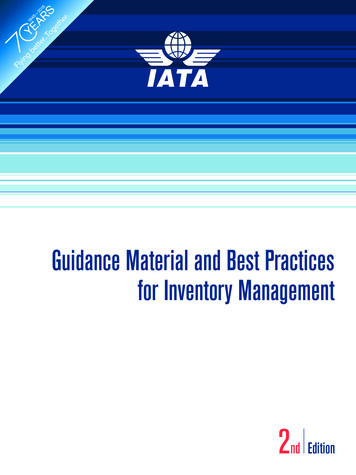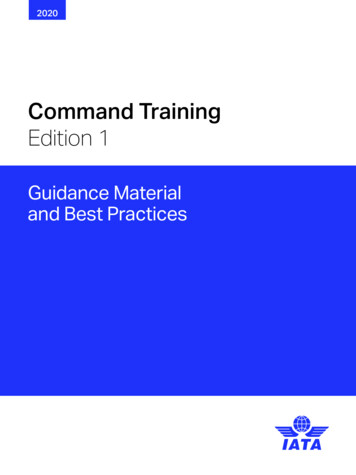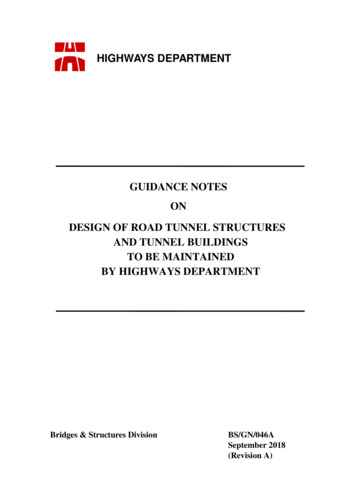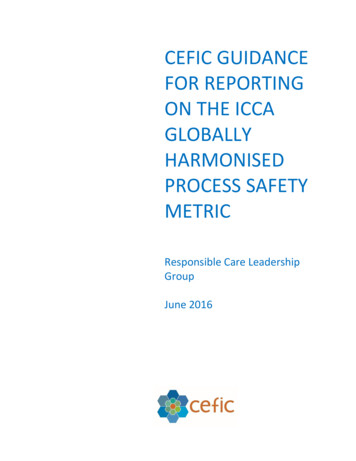
Transcription
CEFIC GUIDANCEFOR REPORTINGON THE ICCAGLOBALLYHARMONISEDPROCESS SAFETYMETRICResponsible Care LeadershipGroupJune 2016
Dear Cefic Members.We would like to express our deep appreciation for the work of ICCA and the Responsible CareLeadership Group in developing this valuable guidance, which we are delighted to bring underthe Cefic umbrella.Process safety reporting is at the very heart of Responsible Care. It has been a proven practicein the chemical industry for decades. We strive continuously to improve our managementprocedures to reduce the occurrence of chemical incidents, and measuring is absolutely crucialto that process – for you cannot improve what you do not measure. Reporting enablescompanies and associations to share best practices and improve their performance whilereducing their environmental footprint. Learning from incidents has been key to improvingprocess safety to today’s low levels and we aim to bring them down further still.Although the industry has long been tracking and reporting process safety performance at aregional level, this proposal for process safety event reporting will for the first time enablebroad-based and global reporting of process safety performance, right across the chemical andpetrochemical industries.We invite all members of Cefic to implement this guidance by 2020, and are committed tohelping them do so. The national chemical industry associations play a vital role in promotingbest practice, and we look to them to roll out the guidance to their member companies.It is our sincere hope that these guidelines will contribute to enhancing process and plant safetythroughout Europe.For your reference, the original and globally applicable guidance:ICCA Process SafetyGuidance Final.docPatrick VandenhoekeWilliam GarciaHead of Responsible Care Leadership GroupCefic, Executive Director HSSE, Energy & Climate Action1
2
ContentsBackground . 4Executive Summary. 4Data to be reported by RCLG Associations to RCLG . 6Overview of ICCA Process Safety Event Criteria as a Flow Chart . 7Key Criteria for Reporting Process Safety Events to RCLG . 8Detailed Guidelines on Identifying a Process Safety Event . 9Table 1 – GHS Classification Table . 13Appendix A – Severity Table: Using A Severity Weighting System is Encouraged for All Associations . 14Appendix B – Frequently Asked Questions . 16Appendix C – List of RCLG Taskforce Members . 22Appendix D – Detailed Schedule of Events . 23Appendix E – Optional Excel Reporting Form . 243
BackgroundThe Responsible Care initiative began in 1985 and as the chemical industry’s commitment tocontinuous performance improvements. Process Safety has been a pillar of Responsible Caresince its inception, and many regional approaches to tracking and reporting process safetyperformance have developed over the 30 years of Responsible Care implementation, yet noglobally harmonized system had been put into place. In 2012, in the wake of several high profileprocess safety events, the International Council of Chemical Associations (ICCA) Board ofDirectors directed the Responsible Care Leadership Group (RCLG) to develop arecommendation for a globally harmonized process safety performance reporting by no laterthan 2015.Throughout 2013 and 2014, a Taskforce comprised of multinational companies and RCLGassociations, chaired by Dr. Peter Schmelzer, Head of Health, Safety and EnvironmentalProtection Bayer HealthCare AG, worked to develop a globally harmonized ICCA approach toprocess safety performance reporting in two variants, UNDG based (following API 754) and GHSbased (an update of the existing Cefic KPI guidance). A list of Taskforce members can be foundin Appendix C. During the same timeframe, the American Petroleum Institute (API) alsoinitiated a process to update its Recommend Practice 754 (RP-754) – Leading and LaggingProcess Safety Metric Standard. RP-754 is broadly used in the refining and petrochemical sectorand in the Americas region to track process safety performance. To optimize global adoption ofa unified standard, the RCLG Taskforce strived to achieve full harmonization of itsrecommendation with the revised API RP 754 metric, finalized in the first quarter, 2016.Executive SummaryAfter more than 2 years of discussion, research, debate and feasibility assessment, the ProcessSafety Harmonization Taskforce recommends that ICCA adopt a process safety event ratemetric. The adoption of this metric would require each RCLG association to collect the numberof process safety events experienced by their members on an annual basis, as well as totalnumber of worker hours (employees and contractors) experienced by their members each year.The process safety event rate is the ratio of events to hours. The Taskforce also recommendsthat reporting of these data points to the RCLG be phased in over the next 3 years, allowingregions with the desire and ability to report immediately to do so, while also allowing additionaltime to companies and organizations that are developing the ability to track these data for thefirst time.The criteria that determine whether a process-related event qualifies as a process safety eventare based on a loss of primary containment of a chemical or a release of energy triggeringthresholds any one of four impact areas: 1) safety/human health consequences; 2) direct costdue to damage from incident; 3) community impact; and 4) chemical release quantity (see theflow chart showing reporting triggers).4
While the original version issued by ICCA allows regions to choose a local reporting basis, thisversion from Cefic refers to GHS (substance classification) instead of UNDG (UN dangerousgoods classification) as well as Euros instead of Dollars.The Taskforce believes that this proposal for process safety event reporting will enable broadbased global reporting of process safety performance across the chemical and petrochemicalindustries. It will provide a roadmap for regions, associations and companies that are currentlynot tracking process safety performance to recognize the benefits that tracking and reportingwill bring. For regions, associations and companies that are already experienced in gatheringprocess safety data, this recommendation allows for broader global alignment and focus oncontinuous improvement in process safety performance. The systems which are built toimprove process safety performance are informed by robust process safety event data, and thisis the major objective of this initiative.5
Data to be reported by RCLG Associations to RCLGOn an annual basis, RCLG Associations will be asked to report two data points into ICCA usingthe RCLG KPI Reporting Website on the schedule provided below.1.2.Total Member Company Worker Hours for Association (employee and contractor)Total Number of Process Safety EventsICCA will use the above two data points to report process safety performance in the form ofProcess Safety Event Rate (PSER), normalized per 100 employees where an employee works2,000 hours a year.(Total Events / Total Hours) x 200,000 PSERRecommended Reporting ScheduleThe Taskforce recommends a phased-in approach for reporting process safety event rate. Sucha schedule will allow more experienced companies and associations to report in the nextseveral years, while allowing other companies and associations to begin reporting by 2019.RCLG Associations would be asked to report the two process safety event rate data pointsannually to the ICCA through the RCLG KPI metrics reporting system:http://kpi.responsiblecare.eu If you do not know your association’s username and password,please contact the RCLG.The proposed schedule for process safety event rate reporting by RCLG associations is asfollows:April 2015June 2015July 2015Feb, 2016 RCLG Reporting20172018-2019 RCLG Reporting2020 ReportingRCLG considers Taskforce proposalICCA Board of Directors considers RCLG finalrecommendationRCLG releases the first detailed reporting guidancedocument for associations and member companiesRCLG initiates process safety reporting pilot programthrough association volunteers with updated an enhancedguidance document; RCLG rolls out final guidancedocument in June, 2016RCLG Associations begin collecting data from itsmembershipOptional process safety data reporting by RCLGAssociationsRCLG includes process safety as a mandatory metric in theKPI reporting program6
See Appendix D – Detailed Schedule of EventsOverview of ICCA Process Safety Event Criteria as a Flow ChartNO: Does not meet the criteriafor a Process Safety EventNOStartWas a chemical substanceor a chemical processdirectly involved?NOYESIncident in production,distribution, storage,utilities, pilot plantswithin a company’sfacility?YESNORelease of material, fire,explosion or implosionfrom/at a chemicalprocess unit?YESRecordable injuryOrhospital admission ofpeople on or off site?YESNODamage 2,500direct costto company?YESNOOfficially declaredshelter in place orevacuation?Or Precautionaryoff site shelter inplace orevacuation?YESYes: Reportable as a Process Safety EventNOSubstance ReleaseThresholds met?NOICCA chemical releasethresholds exceeded?YES7
Key Criteria for Reporting Process Safety Events to RCLGTotal Worker HoursRCLG Associations should report the total number of employee hours worked for each membercompany in their association and the total number of contractor hours worked for eachmember company as a combined, single number. For the purposes of this guidance document,each association should refer to their local and regional definitions for employee andcontractor. The goal for reporting total hours is to include all individuals who are involved withchemical manufacturing, except where those individuals are tasked with major constructionprojects such as large scale investments with specific, one-time project organizations createdfor design, engineering, and construction of new or significant expansion to existing processfacilities. When reporting total worker hours, companies should report the same hours used forreporting personnel hours. This way, companies can have the same data set for occupationaland process safety. Personnel hours should include those hours from all chemicalmanufacturing operations, not just from facilities where a process safety incident occurred.Process Safety EventFor the purposes of this ICCA Reporting, a process safety event has occurred when:A. When a chemical substance or a chemical process is directly involved; ANDB. The incident occurred in production, distribution, storage, utility, pilot plant within thesite boundaries of company’s facility; ANDC. There was a release of material or energy (e.g. fire, explosion, implosion) from a processunit; ANDD. One or more of the following Reporting Thresholds have been met:1. Safety / Injury Injury resulting in a Recordable, Lost Time Accident or Fatality; orHospital admission of anyone on or off site; OR2. Direct Damage Cost A fire, explosion or clean up necessary to avoid/remediate environmentaldamage resulting in a direct cost equal to or greater than 2,500 Euro;OR3. Shelter in Place / Evacuation An officially declared shelter in place (on or off site); OR An officially declared evacuation (on or off site); OR A precautionary off site shelter in place or evacuation OR4. Threshold Release The material released meets one of the GHS thresholds in Table 1.(measured in amount released during one hour)8
Detailed Guidelines on Identifying a Process Safety EventA. Chemical InvolvementWhen a chemical substance or chemical process is directly involvedA chemical or chemical process must have been directly involved in the event or incident. Forthis purpose, the term "process" is used broadly to include the equipment and technologyneeded for petrochemical production, including reactors, tanks, piping, boilers, cooling towers,refrigeration systems, etc. An incident with no direct chemical or process involvement, e.g., anoffice building fire, even if the office building is on a plant site, is not reportable.B. LocationThe incident occurred in production, distribution, storage, utility, pilot plant within the siteboundaries of company’s facilityThe incident occurs in production, distribution, storage (including active storage areas such aswarehouses – see FAQ section), utilities or pilot plants of a facility reporting metrics underthese definitions. This includes tank farms, ancillary support areas (e.g., boiler houses andwaste water treatment plants) and distribution piping under control of the site. All reportableincidents occurring at a location will be reported by the company that is responsible foroperating that location. This applies to incidents that may occur in contractor work areas aswell as other incidents. At tolling operations and multi-party sites, the company that operatesthe unit where the incident initiated should record the incident and count it in their reporting.C. Release of MaterialThere was a release of materia
RP-754 is broadly used in the refining and petrochemical sector and in the Americas region to track process safety performance. To optimize global adoption of a unified standard, the RCLG Taskforce strived to achieve full harmonization of its recommendation with the revised API RP 754 metric, finalized in the first quarter, 2016.
